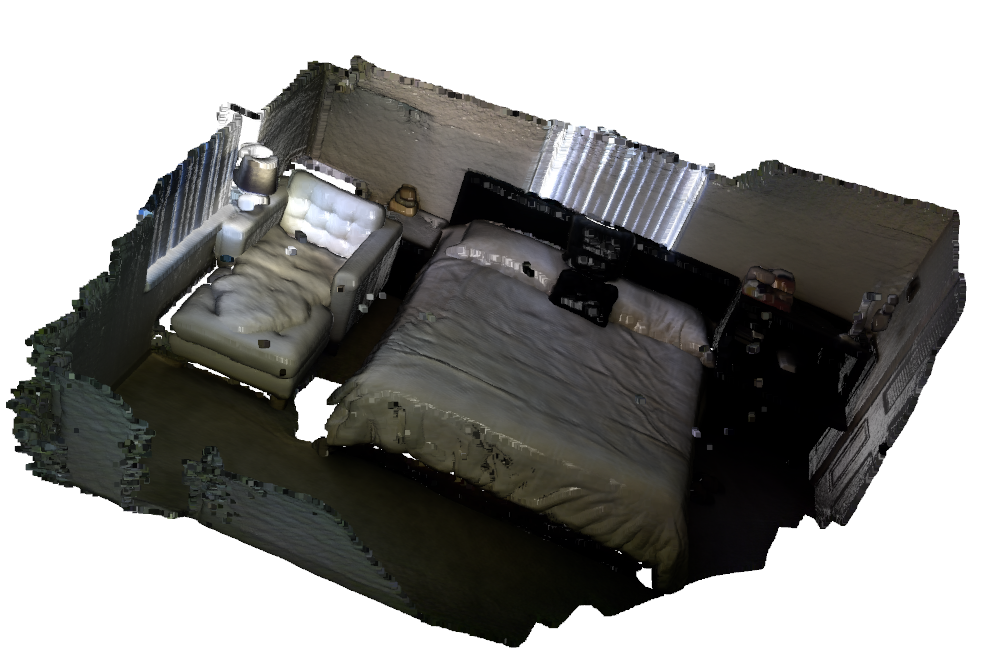Learning Open3D→Tutorial→再構成システム→シーン統合
Input arguments¶
入力引数
このプログラムは、python run_system.py [config_file] --integrateとして実行される。
ここで[config_file]として指定するファイル(例えばReconstructionディレクトリのconfig/tutorial.json)の["path_dataset"]で指定するディレクトリ(例えばdataset/tutorial/)には、同期し位置合わせされるフレームがある画像と深度のディレクトリがなければならない。
[config_file]として指定するファイルにオプションの引数["path_intrinsic"]がある場合、これはカメラ固有行列(詳細についてはカメラ固有行列の読み込みを参照のこと)が記録されているjsonファイルへのパスである。これが指定されていない場合は、PrimeSense工場設定値が使用される。
注: PrimesenseはKinectやXtionで使われている3Dセンサの開発元でAppleが2013年に買収した。
次はexamples/Python/ReconstructionSystem/integrate_scene.pyで定義されている関数runであり、これがメイン関数である。まず["path_intrinsic"]で指定されるファイル(ない場合は、Open3Dのcamera.PinholeCameraIntrinsicParameters.PrimeSenseDefaultを使用)からカメラ固有行列を読み込み、scalable_integrate_rgb_frames関数に渡している。
def run(config):
print("integrate the whole RGBD sequence using estimated camera pose.")
if config["path_intrinsic"]:
intrinsic = o3d.io.read_pinhole_camera_intrinsic(
config["path_intrinsic"])
else:
intrinsic = o3d.camera.PinholeCameraIntrinsic(
o3d.camera.PinholeCameraIntrinsicParameters.PrimeSenseDefault)
scalable_integrate_rgb_frames(config["path_dataset"], intrinsic, config)
Integrate RGBD frames¶
RGBDフレームの統合
examples/Python/ReconstructionSystem/integrate_scene.pyファイルで定義されている関数:
# examples/Python/ReconstructionSystem/integrate_scene.py
def scalable_integrate_rgb_frames(path_dataset, intrinsic, config):
poses = []
[color_files, depth_files] = get_rgbd_file_lists(path_dataset)
n_files = len(color_files)
n_fragments = int(math.ceil(float(n_files) / \
config['n_frames_per_fragment']))
volume = o3d.integration.ScalableTSDFVolume(
voxel_length=config["tsdf_cubic_size"] / 512.0,
sdf_trunc=0.04,
color_type=o3d.integration.TSDFVolumeColorType.RGB8)
pose_graph_fragment = o3d.io.read_pose_graph(
join(path_dataset, config["template_refined_posegraph_optimized"]))
for fragment_id in range(len(pose_graph_fragment.nodes)):
pose_graph_rgbd = o3d.io.read_pose_graph(
join(path_dataset,
config["template_fragment_posegraph_optimized"] % fragment_id))
for frame_id in range(len(pose_graph_rgbd.nodes)):
frame_id_abs = fragment_id * \
config['n_frames_per_fragment'] + frame_id
print(
"Fragment %03d / %03d :: integrate rgbd frame %d (%d of %d)." %
(fragment_id, n_fragments - 1, frame_id_abs, frame_id + 1,
len(pose_graph_rgbd.nodes)))
rgbd = read_rgbd_image(color_files[frame_id_abs],
depth_files[frame_id_abs], False, config)
pose = np.dot(pose_graph_fragment.nodes[fragment_id].pose,
pose_graph_rgbd.nodes[frame_id].pose)
volume.integrate(rgbd, intrinsic, np.linalg.inv(pose))
poses.append(pose)
mesh = volume.extract_triangle_mesh()
mesh.compute_vertex_normals()
if config["debug_mode"]:
o3d.visualization.draw_geometries([mesh])
この関数は、最初にフラグメント作成とフラグメントの位置合わせの両方からアライメント結果を読み込み、次にグローバルスペース内の各RGBD画像のポーズを計算する。 その後、RGBD統合を使用してRGBD画像が統合される。
Fragment 000 / 013 :: integrate rgbd frame 0 (1 of 100).
Fragment 000 / 013 :: integrate rgbd frame 1 (2 of 100).
Fragment 000 / 013 :: integrate rgbd frame 2 (3 of 100).
Fragment 000 / 013 :: integrate rgbd frame 3 (4 of 100).
:
Fragment 013 / 013 :: integrate rgbd frame 1360 (61 of 64).
Fragment 013 / 013 :: integrate rgbd frame 1361 (62 of 64).
Fragment 013 / 013 :: integrate rgbd frame 1362 (63 of 64).
Fragment 013 / 013 :: integrate rgbd frame 1363 (64 of 64).
Writing PLY: [========================================] 100%以下の画像は最終的なシーン再構築を表している。

# 確認用コード
import numpy as np
import open3d as o3d
pcd = o3d.io.read_point_cloud("../ReconstructionSystem/dataset/tutorial/scene/integrated.ply")
o3d.visualization.draw_geometries([pcd])
白井が実行した結果は…ゴミが残っている。
